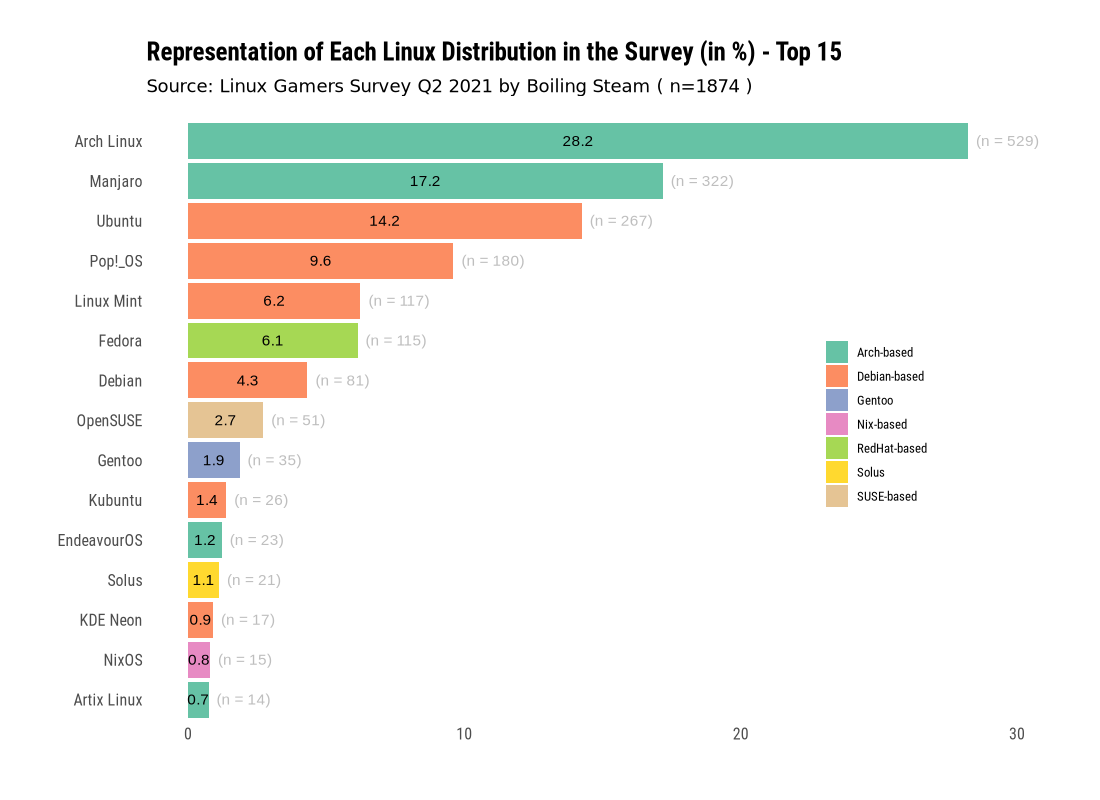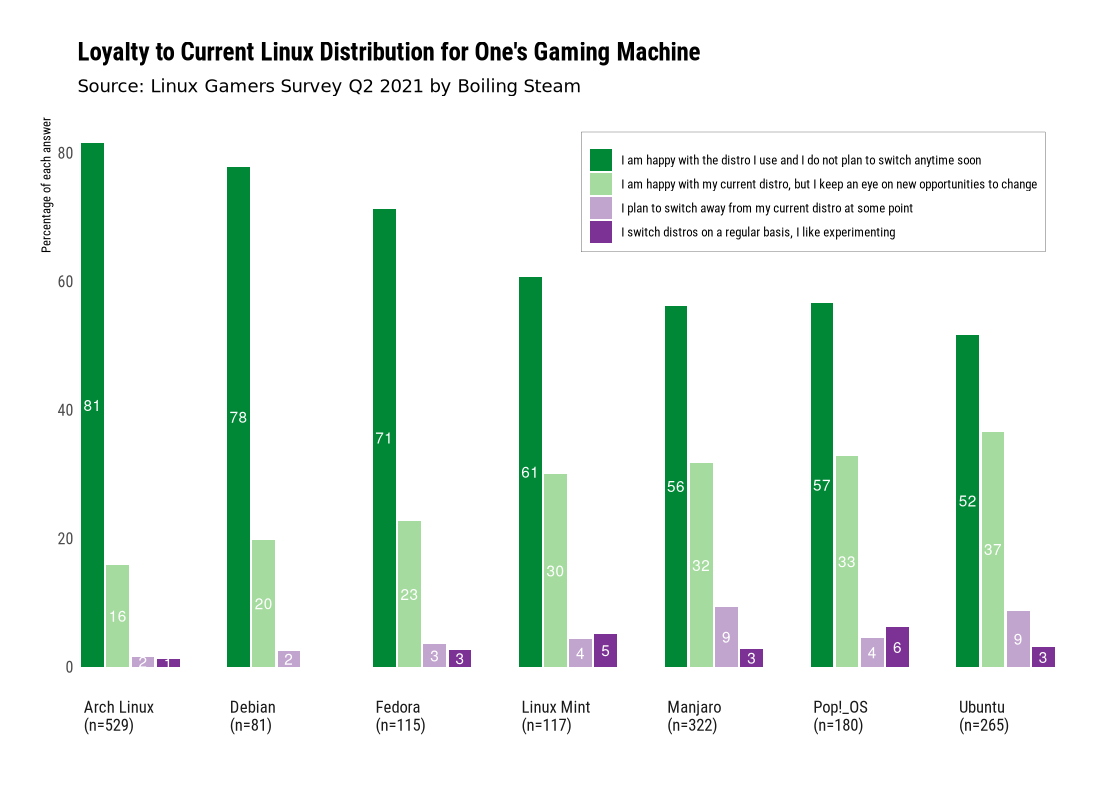Which Linux Distro For Gaming? Q2 2021 Survey Results
Here is yet another post about the survey we have conducted back in Q2 2021 (April to be precise) with close to 2000 Linux Gamers. This time we will focus on the Linux distribution of choice of respondents in the survey. Before we jump to the results, keep in mind this is probably not representative of Linux users at large in the whole wide world, but rather of the Linux Gaming demographic found on places like r/linux and r/linux_gaming for example (as well as our readership). How should we describe them? Typically younger audience, well connected and following the news of the Linux gaming world? That’s probably one way to put it.
Distro of Choice
Now, let’s look at the distribution choice among our respondents:

Our respondents lean heavily towards Arch-based distributions - Arch, Manjaro, EndeavourOS, account for about 45% of the whole group. Ubuntu is still a very important distro, but I feel like it’s progressively eroding on the market. For example, this is the first time I see Pop!_OS so strong and even bigger than Linux Mint. Fedora is pretty much around where we expect it (many people recommend it but it remains a small distro in every sample we see, whether it’s here or on ProtonDB). Solus is still there but is not growing either (at least it’s not losing its original following).
Distro Loyalty
This time we asked another question about whether or not you would consider moving away from your current distribution of choice for Gaming in the near future. This leads to this next chart:

Wow! It looks like if you end up on Arch Linux, you are certainly not likely to change afterwards - very high retention/satisfaction probably. I’m definitely in this category; after getting used to Arch, I have moved most of my machines to Arch as well, and never looked back.
Here is what people who fall in this category left as comments:
-
After a lot of distrohopping, I settled on the best supported rolling distro.
-
Up to date software always, especially when it comes to gaming performance
-
Rolling release better for AMD graphics and latest kernels
-
A lot of control over installed programs, with ease of installation due to pacman/AUR
-
Arch wiki and AUR is the best.
-
Updates don’t break the system, bleeding edge software, huge selection of software
-
I use arch btw
On the other hand, it’s extremely surprising that Manjaro, which is under the hood mostly Arch Linux with an installer, does not remotely get the same level of loyalty from its current users. Among the ones who are considering switching away from it, we could get the following comments:
-
I like Arch but I am lazy so currently using Manjaro
-
Manjaro was a good Arch distro before they added Snap and Flatpak
-
Settled because it just has the things I want without a lot of others. Arch is nice for the wiki and AUR. Considering switching because of compatability or troubleshooting weird issues sometimes.
-
Arch is my actual preffered distribution. I switched to Manjaro just to limit the number of times I have to mess with my system. I just don’t have that much time for this. It was one of the hardest decisions to make when my son was born… This sounds like a joke and I wish it was.
-
More involved than Ubuntu, but easy enough to use to learn Linux (I plan to switch to Arch at some point).
In many ways it seems like Manjaro is used as a trade-off: it’s “Arch if you don’t want to spend time.” Also Manjaro has gained some bad rep in the past few years with the (now-ex) treasurer’s personal use of funds collected for the development of the distro.
Looking at the other distros, Ubuntu is one of the worst in terms of loyalty ratings as well, and Pop!_OS, while growing in popularity, does not seem to fare much better either.
Here’s some reasons people mentioned about staying on Ubuntu:
-
I’ve been using Ubuntu since 6.06 LTS; it’s stable, has a nice, friendly and helpful community, and it’s still the distro recommended by Valve for Steam. Also I’m very used to it, and changing distros would include a lot if time to get things “my way” again. Time is becoming more and more prcious though.
-
Ubuntu is the easiest to get stuff working on, even though package conflicts are literally hell
-
Used to use Gentoo, not enough time to mess with things anymore. Ubuntu “just works”
-
Community support and guides. Vast majority of ‘How to’ internet guides for Linux use Ubuntu, and any software that supports Linux usually supports Ubuntu first and then other distros onward from there.
-
It just works. Large software repository. Everyone checks for compatibility against Ubuntu.
-
Slackware (teens) -> Gentoo (twenties) -> Debian (late twenties and thirties) -> Ubuntu (thirties to $CURRENT_YEAR). While I’ve tried others too (Arch and Manjaro specifically) I like Ubuntu because I’m old and used to it I guess. I still use Debian for servers though.
-
Fastest and easiest setup with NVIDIA Drivers
The frequent comment about Nvidia is something we had already observed inside out with our AMD vs Nvidia article: there’s a lot more Ubuntu users among Nvidia owners, and this is linked to the easiness to get Nvidia support in it. Aside from that, Ubuntu is as much of the “norm” as you can get out there: everything is tested against Ubuntu so you have a large access to software that comes with it.
How about Pop!_OS? Since it’s more recent, let’s look at the reasons why people picked it up and intend to stay with it:
-
The setup was incredibly simple, had to change to Manjaro for RX6000 support for a bit, but when moving to a new SSD, the setup to get it working was way easier on Pop
-
Out of the box nvidia and steam support (Pretty sure Steam doesn’t come pre-installed with Pop, you can download the ISO with NVIDIA drivers but Steam needs to be installed post-installation. So I’m not sure what the commentor meant by this)
-
Better hardware support and quality of life than Ubuntu
-
It’s comfortable with minimal tweaking. I don’t like excessively switching.
-
Nvidia drivers and ability to switch between integrated/dedicated/hybrid GPU options comes as default.
-
It’s the best seamless experience I’ve had on Linux so far, “it just works”.
I have also tried Pop!_OS myself, and I did find the experience more polished out of the box compared to Ubuntu. Better defaults. I have also heard many times that its support for hybrid GPU is excellent as is, which is something somewhat time-consuming to get working in other distros. Pop also features its own PPA for some more recent packages as well as very specific applications that can be installed with apt like TensorFlow and Android Studio. And it does not use snap at all (which is semi-proprietary) and gives Flatpak as an option: as I said, better defaults.
Now let’s look at the other two best ones of the pack in terms of loyalty: Debian and Fedora. I am always surprised to see people gaming on Debian, since it typically uses older packages by default (if you are on stable) and seems to be a little incompatible with having recent hardware or needs for more updates.
-
After distro-hopping, Debian achieved to be the best trade-off for my usage and is, objectively, a very good distribution with a lot of advantages.
-
It’s solid and stable; I prefer stability over newness.
-
Running the unstable version. Extremely familiar and comfortable on Debian; used to be an official developer.
-
Debian testing: Good balance between new features and stability, libre-focused
-
Stable, light on resources, de-bloated, does not interrupt the UX with constant updates or something else. It does the job out of the box.
So: stability, familiarity, libre aspect. Note that recently HexDSL has settled on Debian after spending a lot of time on Arch (yes, as strange as it sounds!)
Finally, let’s take a look at Fedora and why people use it:
-
Because it’s so well aligned with GNOME (GNOME devs use it often), and GNOME is easy to use
-
Fedora is stable as a rock, extremely well configured, the best of GNOME and comes with the newest technologies.
-
Up-to-date but not so much that programs are broken
-
Frequently updated drivers and kernel, which is ideal for gaming
-
Just works, both for latest games and workstation workloads.
In other words, if you like GNOME, it’s probably the best rolling distro to get out there.
It goes a long way to demonstrate that there’s no one reason to prefer one distro above the others. In most cases, it’s what fits best with the user’s expectations, desires and experience.
What’s Next?
We are not done with the Q2 2021 survey analysis yet. Just to make sure you did not miss anything, we have already covered the following topics:
- AMD on the Brink of Taking Over?
- Cloud Gaming: Is it Going Anywhere?
- Where Do Linux Users Buy Games? Meet 5 Different Profiles
- Linux Gaming Predictions for 2021: What did Survey Respondents Think?
So what are we going to focus on next?
- Evaluation of Proton
- Awareness of software and tools
- Outlook on VR
- Dual Booting
As you can see, we are far from done. And by the time we will be, we’ll have the next survey out for Q3.
